|
Welcome to A&A. There are 25 full reviews in this issue. Click on an artist to jump to the review, or simply scroll through the list. If you want information on any particular release, check out the Label info page. All reviews are written by Jon Worley unless otherwise noted. If you have any problems, criticisms or suggestions, drop me a line.
|
|
|
A&A #229 reviews (May 2002) Old Friends (short reviews of previously-reviewed artists):
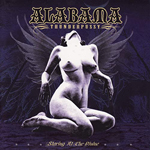 Alabama Thunderpussy Alabama ThunderpussyStaring at the Divine (Relapse) Thick stoner rock riffage combined with the groove instincts of an Agony Column. Pile-driving beats, thick guitars and driving bass work. Kinda outstanding, when you think about it. There's nothing complicated to the formula, of course. Lots of bands attempt to play music this well, but most fail. I 'm not sure why, but I think it has something to do with attitude. As the name of the band implies, there's no shortage of that here. What's most interesting is that there is a complex character that can only be appreciated (or even heard) at high volume. Played at a regular level, you might think the sound is a bit generic. Crank it up, and you'll hear entire worlds you missed before. It's that sort of attention to detail that puts Alabama Thunderpussy right out at the front of the pack. Crude? Undoubtedly. Simple? Never. And that's why this puppy smokes.
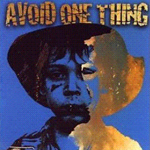 Avoid One Thing
Avoid One ThingAvoid One Thing (Side One Dummy) Joe Gittleman is the voice (singing and writing) of Avoid One Thing. His singing is reminiscent of Dave Smalley (just enough rasp to make the melodies sound slightly ragged), and his writing (generally) reminds me of early Social D. But Gittleman and company aren't out to sound like anyone else. This is tight power pop punk, but there are moments like the drum machine-driven "Lean on Sheena" that give a hint as to the real greatness lurking within. Any punker who's willing to use acoustic guitar and wax vaguely sentimental deserves some praise. To do so without sounding trite or dull signifies writing of the first order. The playing is spectacular as well, highlighting all the right spots. Just a great album. The sorta disc that just knocks me out from beginning to end. Joyous, but with enough thought behind it to keep me coming back for more. Bravo.
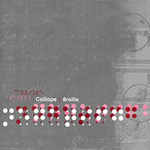 Calliope
CalliopeBraille (Thick) Meandering, occasionally maddening pop stuff. To call this introspective would be a horrific understatement. Calliope is so far underneath its own skin it's swimming in ... well, I think I'm taking that little metaphor a bit too far. Nonetheless, I hope you get my point. The melodies are disjointed, but they are sweet. You've just got to let them express themselves in their own time. Calliope cannot be rushed to do anything, especially when it comes to tying a song together. A couple of pieces here don't click until the very last thought is expressed. It sure helps to be able to float along with the flow. Impatient listeners will give up long before the good stuff arrives. Sometimes the moment of epiphany comes after the song is done. All of a sudden, it makes sense. I like challenging music. Calliope doesn't pander to ignorant listeners with short attention spans. Rather, these songs reward those who like to think about the music they hear. Dive in headfirst and let the experience move you.
 Camber
CamberWake Up and Be Happy (Deep Elm) Further redefining the emo universe (or perhaps proving once and for all that emo isn't a sound, but rather a state of mind), Camber blazes forth with an album that is more catchy art rock (how's that for an oxymoron?) than anything else. Not so noodly as Radiohead, of course, but this puppy has its proggy moments. The sound retains that comfy punkish fuzz, but what lies behind that scrim is decidedly ambitious and complicated. And it all sounds so good. Camber still likes to bash out songs, no matter how involved they have become (and let's be fair; the guys never wrote a straight three-chord piece). That attitude extends to the production sound, which is tailored for aggression. Aggressive ideas as well as playing. Ambition is a great thing in a band, as long as it doesn't lead to pretentiousness. Camber easily stays on the hang-loose side of that divide. These guys don't hit you over the head with their brilliance. They let the music do the talking. And it says volumes, believe me.
The Connection Extended Play EP (self-released) Six songs, all of them tight--yet restrained--pop music. I get a real Britpop feel, somewhere between I'm the Man-era Joe Jackson and the Wedding Present. I realize there's quite a range there. The Connection has that sort of reach. And sometimes when you pick just six songs, you pick six real good ones. That's what these folks have done. Don't know if the guys can make it stand up for a full-length, but I'd bet on it. There isn't a clunker here Just songs that say more than is apparent on the surface. Take a second listen and discover a whole new meaning. Man, there's just nothing better than that.
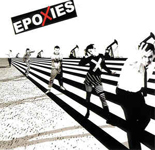 The Epoxies
The EpoxiesThe Epoxies (Dirtnap) The new wave had to come out of punk music. The emphasis on musical simplicity (not to mention a reliance on three chords and a dream) was a reaction to seventies hard rock excess and disco, to be sure, but it sure helped that a few freaks with weird hair led the way. The Epoxies bring those heady days of the early new wave back, but with an almost self-conscious punk sound and attitude. Yes, there are tinny synthesizers, but Roxy Epoxy (even the name screams punk) growls as much as sings. She holds the tunes with power. And when it really matters, the Epoxies drive the songs faster and faster, eschewing melody for more basic instincts. Gloriously frantic and wonderfully pretty to boot. Um, yeah, this is one of those ear candy moments for me. The Epoxies update the new wave with some real style, but I'm not worried about specifics. I just love the way this album sounds.
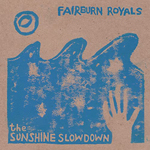 Fairburn Royals
Fairburn RoyalsThe Sunshine Slowdown (self-released) Seems to me that more and more bands these days are finding cool ways to update roots music. Fairburn Royals can play the stuff straight, but generally the folks find one or more ways to dress up the basics. Lots of experimentation with distortion and studio editing, particularly in the intros to the songs. I'm guessing the genesis of many of these pieces was often a long ways removed from the way they ended up. What I really like is that the tricks and experimentation serve to complete the songs rather than simply hang as ornaments. Everything on this album was done for a purpose: To make good music. And that's what we have here. Fairburn Royals have constructed an album with a solid foundation and a ceiling that just keeps rising and rising. Boy, do I like the way these folks think.
 Philip Gayle
Philip GayleSolo Live '98 (Yabyum Productions) Philip Gayle plays mandolin, guitar and "modified 3-string toy guitar" on this set, which was recorded in various locations in the second half of 1998. That, I'm afraid, is the best overall description of the music I can give. On the other hand, I can describe a few more specific pieces. Gayle tends to shift from one instrument to another, leaving the first to continue vibrating while he picks at the second (or third) implement. The songs aren't particularly coherent, but they do make sense on the whole. I liked to dive into the sounds, to hear exactly what was lying beneath the grate of the picking. Even the vinyl strings of the toy guitar would continue vibrating for a second or two after being plucked, and that aftermath is just so cool. Yeah, on one level this is the sound of a guy making noise. But the noise has a purpose, or at least, my ears invented a purpose for the noise. Gayle has a real knack for making the utterly experimental and "out there" sound just a wee bit inviting. Take a chance, if you dare.
 Ed Hale and Transcendence
Ed Hale and TranscendenceRise and Shine (TMG) Ed Hale and Transcendence play exceptionally catchy AAA tuneful rock (with just the right dash of soul). I usually don't go for this kind of commercial project. There's just the one thing. These guys are really, really good. Which is not to say the music is edgy. It's not. There are rounded edges aplenty. Not a problem, as Hale imbues his songs with so many ideas that it's hard to get bored. There are all sorts of musical references to ponder, and the lyrics, likewise, ask more questions than they answer. And it's all wrapped up in this pretty package. This stuff could be played on the radio without a question. The sound is big and sharp and shiny. But there's a certain substance that's missing from most mainstream rock. Or, to put it more plainly, there's a there here. Highly enjoyable music that slyly challenges. Hale and friends don't charge straight for the edge, but they manage to trip a few nice tangents anyway. A real solid package.
 The High Violets
The High Violets44 Down (Reverb) The High Violets certainly belong on a label called Reverb Records. There's plenty of reverb in the guitars here. A fair amount of distortion, as well. The sound is reminiscent of early My Bloody Valentine, though without the extraordinary level of production tricks. Rather, the High Violets seem intent on creating their dreamy, introspective, psychedelic pop sound in a live setting. I doubt these songs were played live to tape in the studio, but I have the feeling they could have been. There is an electric feel to the songs that is often the result of such a recording. Pretty? Not really. Beautiful? To be sure. It's important to understand the difference. The High Violets go for the deeper result, and they succeed. There's a texture to these songs that is almost addictive. It's so easy to latch on and peel the layers. There's something about bands who work so hard to control their atmosphere. Oftentimes, the results sound forced and canned. The High Violets, on the other hand, have created their own musical world. One that sparkles with vitality and grace.
������������������������������  Lakeside Project
Lakeside ProjectAnimal Logic (Matchpale) The whole noise rock/jazz fusion thing really lights up my brain. There's something about not-quite abstract lines weaving patterns in the air that just undoes the fetters on my mind. The Lakeside Project specializes in this sort of music. The lead guitars plays often atonal melodies, allowing the bass and electronic elements space in which to express themselves. And when I say electronic, I mean keyboards and drum machines and the like. The result is an oddly orchestral manifestation of this sound. Unlike, say, June of 44, which would often take a minimalist approach. These songs remind me more of Iceburn and other more "full-figured" kinds of bands. Even when the sound gets gritty, there's a certain fullness that can't be missed. Only five (long) songs, but they're more than enough to knock me out. There's enough experimentation and musical thought to reward the demanding listener, and yet the complete nature of the arrangements ensure that everyday folks will find plenty to enjoy as well.
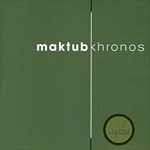 Maktub
MaktubKhronos (self-released) If one good thing came out of the 70s (in terms of music, anyway), it was the fertile cross-pollination of soul and rock. Sure, Sly and the Family Stone and a few other pioneers started this trend in the 60s, but the idea really took hold when Stevie Wonder went nuts (in a creative way). Then, late in the decade, Prince came along and started to get crazy himself. Maktub likes to ply the extremes of this idea, merging very smooth vocals with often hyper-aggressive guitar riffage. Not unlike some of Faith No More's work, but with the approach coming from the soul, and not the rock, side of the coin. And the guys aren't afraid to fully commit either way. There are some really sweet tunes here, and there are some heavy-duty rockers as well. Then there's a cover of "No Quarter" that subtly shifts the focus of the song. I like that a lot. Mostly, though, this disc rolls. The fervent desire to stick to the groove is omnipresent. There's something cool going on here.
������������������������������������� 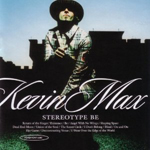 Kevin Max
Kevin MaxStereotype Be (ForeFront) The first question I have is "Who is this guy?" Kevin Max co-produces his album with Adrian Belew, and he gets Tony Levin (among many stellar session folks) to play along. The songs fall somewhere within an electronic update of Marshall Crenshaw's roots pop, though Max isn't afraid of spinning in many different directions (often at once). Belew keeps the whole concoction purring. I can hear his hand in some of the arrangements (there are a few distinctly Belewian moments here), but mostly he simply keeps Max from trying too many things for his own good. The sound itself is crunchy and commercial, though perhaps a little too manic for the mainstream. I don't mean manic in a sense of tempo, but just in the number of ideas that fly out of these songs. Sometimes, simple is better. Every once in a while I wish Max stripped down a notch. Mostly, though, I simply sat entranced. Sometimes pretty, sometimes downright gorgeous, Max's songs always have something to say. And they're all more than worth hearing. A soft pillow to fall into, most certainly.
�������������������������������������  Mr. Lif
Mr. LifEmergency Rations EP (Definitive Jux) If it seems to you that everyone is walking lock-step with a decidedly warped Bush administration, well, let me present Mr. Lif. He's got a few things to say about the repression of thought. I gotta tell you, I'm with the guy all the way. Lif's imagery isn't the most creative, but his ideas are dead on in their incisiveness. There is no room in America for silencing opinion of any sort, no matter how odious. And anyway, who was the moron who equated patriotism with militarism and consumerism anyway? Um, I'll give you a hint. He wasn't actually elected president. But this isn't my polemic. It's Lif's. Goddamn if it isn't great to hear some sharp political hip-hop. Give this a spin or three and see if your activist genes don't get switched on.
������������������������������ 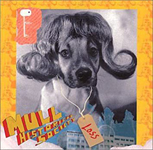 Mull Historical Society
Mull Historical SocietyLoss (XL-Beggars Banquet) Another fine British import from the folks at Beggars Banquet. Colin MacIntyre writes and sings, and he gets a few friends to play along. There are moments here that do sound like a clunky one-man band, though to be fair most of the players are consistent throughout the album. What is also consistent is the vaguely off-kilter slant to the songs. The music does fit into the Britpop tradition, but that's a pretty wide basket. Most specifically, MacIntyre combines his oft-quavering vocals with Big Star chord progressions. There's a definite soulful effect to the enterprise. The lyrics can be elliptical, though that's not a certainty. As often as not, the words mean exactly what they say. It's at those points when the music starts trailing off into tangents. And so a part of each song is always centered, no matter where the rest of the piece is headed. This creates a most listenable set, highly enjoyable and still deep enough to stand up to multiple listens. Not yer usual fare, but a fine one in any case.
������������������������������ ������������������������������������� 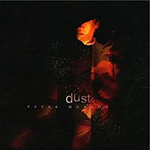 Peter Murphy
Peter MurphyDust (Metropolis) Fresh off the "rediscovery" of Bauhaus that has come in the last few years, Peter Murphy keeps pumping out his solo work. As has been the case with all of his post-Bauhaus albums, he hasn't bowed to convention or attempted to please everyone. I've gotta hand it to the guy; he sticks to his guns. And so it goes here. Nine songs that clock in at nearly 70 minutes total. Murphy infuses his usual tortured pop songs with a number of influences, much of them coming from the Middle East and Indian subcontinent. He doesn't worry if each idea instantly connects with the others; rather, he sorta throws the stuff into a stew and lets everything soak for a while. Sometimes this method does work. And even when it doesn't, the songs are arresting in their stark beauty. Easy listening, this is not. Murphy never has fit into that category, and so I'm not surprised at the aggressively ambitious nature of this album. And like I said, even if he's not completely successful, Murphy is always worth hearing. He has a sense of sound that always impresses me. Suffice it to say if you've been a fan in the past, this album should satisfy. He may not win over a lot of new converts, but then, he's never tried to do that. It's always good to be true to one's nature.
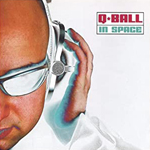 Q*Ball
Q*BallIn Space (self-released) A delightfully crunchy elektro-industrial confection. Q*Ball is lucky enough to have Ron Thal (a.k.a. "Bumblefoot") as a co-producer and guitarist, and so his songs have a decidedly rock base. Which is cool, considering that his beats are so light and fluffy. The electronic side of the sound is cute and bouncy, quite the counterpoint to Thal's thick and heavy riffage. The combination might take a moment or so to really sink in, but it works. If you want pure Q, check out "Chew." That's the airy side of his personality. The rest of the disc trips toward the experimental and heavy, but never without losing the sense of fun that I've always liked in Q*Ball's music. Say, a song called "Edith" that samples Jean Stapleton's warbling of "Those Were the Days" from "All in the Family." That one is pure slamming dance floor heaven. I hear a lot more different ideas here than I did on the shorter set I reviewed a while back. That's good. It means that Q*Ball is still challenging himself, finding ways to make his music even better. He's learned that the moment you stop growing, you stop living. A lesson we can all take to heart.
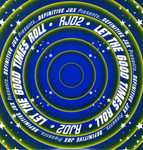 RJD2
RJD2Let the Good Times Roll 12" (Definitive Jux) And now for something completely different from Def Jux. RJD2 isn't yer average hip-hip artist or DJ. This song is an astonishing pastiche of samples and other spinning tricks. For the most part, the original sources are so sped up, slowed down or distorted as to be unrecognizable, leaving a funky, trippy sound for all to enjoy. Well, there is a sample of "Mannish Boy" that I could make out, but that's about it. And just when I think I've almost got a handle on the tinny, manic funk of the song, the gears shift right into dub. An unexpected bridge, but one that works quite well. The full-length arrives this summer. Keep yer eyes peeled, folks.
 Roman Evening
Roman EveningTogether Now (Bitter Stag) Adam Klein has that Neil Young nasal vocal style. Also like Young, he's quite good at expressing emotions and ideas through his voice. His is not a technically stellar instrument, but it's a very artistic one. In the same way, his bandmates in Roman Evening cobble together a number of vaguely clunky songs. The arrangements are ambitious and far-reaching; there are a few missed notes and the occasional bit of (I think) unintentional dissonance, but all that works together to create the intensely introspective mood of this album. When I talk about the arrangements, I'm speaking more of the way the instruments are used. The sound is sparse, but at times it seems astonishingly full, though generally only four or five instruments are tracked at any one time. It's like my ears have been tricked to think a more orchestral sound exists when it doesn't. Tricked in a good way. These songs are tightly crafted, even with a few blue notes. I may have to rethink my assessment of the playing--perhaps there is intent behind the (very) occasional flub. Because this album has a "just so" sound to it. Just so, but laid back as well. Quite well done.
������������������������������ 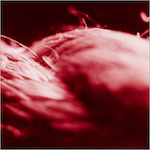 Rope
RopeFever (Family Vineyard) Speaking of sonic crafting... Rope is a Polish duo featuring Przemyslaw Chris Drazek on guitars (and trumpet) and Robert Iwank on bass (and the occasional vocal). When the songs have structure, they follow Iwank's bass. Most often, though, Drazek's guitar drives the action. And that action sometimes sounds decidedly chaotic. In a good way. This isn't noodling for the hell of it. Drazek generally follows the variations on a theme structure. There is something at the base of the noise. But his ideas are often dissonant and sharply so. He's listened to some Henry Kaiser in his day, I'd guess. Or Marc Ribot. Take your pick. Iwank does his best to help to tie the music together. His ideas are nowhere near as extreme as Drazek's. And so the two work very well together. They don't play off each other so much as simply work together to create complete songs. Four of them, actually, which might be daunting enough without the fun of the music inside. Certainly this isn't for the masses. But discriminating guitar fans might find a new hero here.
�������������������������������������  San Agustin with Suzanne Langille
San Agustin with Suzanne LangillePassing Song (Family Vineyard) Suzanne Langille has often recorded albums that rejected any conventional sort of form or structure. I didn't like those much. That's probably a failing on my part, but also a question for the past. I really like Langille's work when she's got a band behind her that has a wee bit of melody in what it does. Her blues work with Loren Connors, for example. And while San Agustin is hardly the rowdiest outfit around, there is a commitment to melody. Understated, certainly, but a commitment nonetheless. And when Langille drapes her voice over the sonic landscapes painted by the land, the result is a more complete picture than might have been imagined before. This is mostly San Agustin, with Langille on the edges. But her work is integral to every song on which she sings. Whether as a counterpoint, a continuation of a theme or a simple exclamation point, her voice completes the work. A fine collaboration that brings out the best of all artists involved. There's plenty of ideas here to savor over and over again.
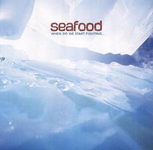 Seafood
SeafoodWhen Do We Start Fighting ... (Nettwerk America) With lead guitar that neatly bridges the gap between the Wedding Present and standard strident emo and a decidedly American approach, Seafood is hardly your average Britpop outfit. When I say "American," I'm mostly talking about the slickness of the sound. There is a real emo power pop feel that I'm not used to hearing from British bands (most of whom tend to prefer sweeter hooks and melodies). Perhaps this has something to do with the fact that Eli Janney recorded this puppy in Brooklyn. The use of dissonant chords and vaguely atonal harmonies colors this music in a most fascinating way. There is, of course, the standard Britpop refusal to stick to the same sound throughout an album (some might call this musical attention deficit disorder, but I prefer "commitment to diversity"), but as usual that somewhat whipsaw writing style falls pleasantly on my ears. It's interesting; when bands remove just a bit of the honey the hooks become a bit more human, more approachable. Seafood tears itself a few tasty chunks of riffage here, much of it well outside the standard pop realms. Bravo for that.
������������������������������������� 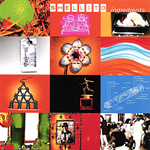 Shellito
ShellitoIngredients (Birtha) That XTC sorta thing. Done quite well. I know, I know, you'd think someone like me could come up with a better reference for complex, restrained-yet-jaunty pop music than that (say, the Church?), but I'll stick to my guns. And anyway, we're just talking about a starting point. Shellito is mostly Mike Shellito, with some help from his pal Jeff Tanner. The songs are very much stream of consciousness, little observed bits from everyday life. The lyrics don't always tie up neatly, though they always fit very well into the tightly-structured songs. And man, these are some pretty pieces. Shellito (the guy) sure knows how to craft songs. Which is not to say he adheres to formula. It's just that even the smallest part of each song here is there for a reason. When such well-constructed songs skip and bound like these, well, you know you done good. These pieces are much more complex than they sound, which is one of the higher compliments I can bestow. First rate. Joyous, even.
������������������������������������� 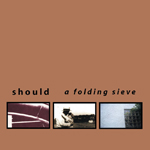 Should
ShouldA Folding Sieve (Words on Music) A re-issue of Should's original A Folding Sieve (which came out in 1995), with a 7", some unreleased tracks and a song from a compilation added to the list. Not the most coherent of discs, of course, but this is Should. And the music is compelling. And if you happen to be wondering just what sort of stuff Should does (shame on you for not knowing!), well, it's much along the same lines as another Austin outfit, Bedhead. These are dreamy songs full of intense distortion and emotion. Dreamy and intense are not entirely mutually exclusive, as it turns out. This set does sound a little dated to me, and it should. The stuff here was recorded between 1993 and 1997, which does make the "bonus" stuff here something of an odds-and-ends completion exercise. Not like the stuff is filler. It doesn't necessarily fit in with the first 7 songs (A Folding Sieve), but even so exhibits the same sort of quality. Something of a time machine. Even Should and the Kadane brothers (the guys behind Bedhead who more recently have used the moniker The New Year) don't play quite like this any more. Which is all the more reason to give a listen and celebrate greatness past.
Valender The Giant Slingshot (Smokeylung) Minimalist pop with plenty of ringing reverb. An interesting sound, one that I haven't heard used quite this way before. Though I'm sure some Pavement fans are going to start screaming at me at any moment now. I guess that's a backhanded reference. But Valender isn't particularly pretentious in its songwriting or playing. Indeed, these songs are astonishingly understated. At times, I wish the guys would let themselves crank things up a notch. But then I realize what's going on. Restraint has its own power. By not rocking the masses, Valender is writing by omission. While these songs are beautiful for what ca be heard, the beauty is enhanced by what the band doesn't do. I hope this concept makes sense to you, because I'm doubting it even as I write it. Ah well. I'm gonna stick with it. Simplicity has its virtues, and one of them is the ability to make pretty music without a raft of tricks and effects. Let the music be the star. Valender's tunes certainly deserve at least that much.
������������������������������
Step Kings 3 the Hard Way (We Put Out Records) ������������������������������������� |
|
return to A&A home page